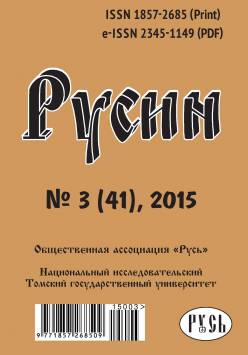Summary.pdf Igor Burkut. The Historical Fate of the Galician and Bukovinian Rusins.The author studies the development of the Rusin Movement in Bukovina and Galicia and believes that the events of WWII completely ousted from common usage the old identification of Rusin in all its variations among the Galicians and Bukovinians. However, contemporary Galicians and Bukovinians, who presently regard themselves as Ukrainians, do not forget about their Rusin roots. The problems of today rarely disappear into the past and without a detailed study it is not possible to find a solution to such major issues of the contemporary Ukraine as the formation of the current Ukrainian nation.Sergei Suleak. Rusins: the past, the present, the future. During the time of the USSR the history of the Rusins, the native population of the Carpathian Region, was silenced due to ideological reasons. The consequences of that ban continue up to the present. Many issues regarding the history of the Rusins are not clarified. Today we have the opportunity of openly declaring our identity. However, no matter whom we consider ourselves to be, the descendents of the Rusins should not forget about their roots and their ancestors.Mikhail Feisa The forms and methods of the Ukrainianization of the Rusins-Rusnaks of Serbia and the influence of this on the status of the Rusin language. Rusins-Rusnaks of Serbia continue to experience Ukrainianization, which is carried out by local Ukrainian activists. They endeavor to prove that the Rusins of Voevodina are a sub- ethnos of the Ukrainians and their language a dialect of Ukrainian. The Rusins of Serbia want to uphold their right for their original national self-identity.Iurii Danilets. An Essay about the History of the village of Koshelovo in the District of Khust, Transcarpathia. In the material presented special attention is given to the toponyms of the village. Its history is examined from the 15th to the 20th centuries in detail.Viktor Kichera. The Cultural-Educational Activity of the monks of the Mukachevo Monastery in Transcarpathia. The monastery played an important role in the history of Transcarpathia. The monks not only concerned themselves with religious matters but gave much attention to the cultural and educational also. In the schools and libraries which were affiliated with the monastery the monks continued to educate. Such known scholars as A. Kotsak, A. Kralitskii and A. Bachinskii arose out of this process.Bishop Iov (Smakouz) The Service to the Church by the dedicated son of Galician Rus' Archbishop Panteleimon (Rudyk). (On the 50th Anniversary of the Establishment of the Edmonton-Canadian Diocese of the Moscow Patriarchate). Archbishop Panteleimon was a native son of Carpathian Rus' who gave much effort for the restoration of the old ancestral faith in Galicia. At the Pochaev Lavra and in other areas of Volynia he organized monastic life and in Kiev during the years of WWII stood firm on the position of the unity of the Russian Church in opposition to the Ukrainian Autocephalic Schism (1941-1943). In the last years of his life Archbishop Panteleimon worked among the Rusins creating a newly established diocese of the Moscow Patriarchate in Canada.Andrei Svitlinets. The life and activity of Schi-archimandrite Vikentii (Oros) (1901-1982). In the article the work of Vikentii Oros in the Orthodox Church of Transcarpathia is analyzed. He was the founder of several monasteries and suffered under the Soviet system. However, after internment he continued his religious activity.Dmitrii Daniliuk. The well-known scholar Slavist M. Luchkai (1789-1843). (On the 220th Anniversary of his birth). The life and creativity of the initiator of Transcarpathian Slavistics, a well-known folklorist, cultural enlightener and church activist is analyzed in the article. The author confirms that M. Luchkai was a scholar of European standard, a patriot, humanitarian whose historical inheritance still awaits research.* annotations of the material published in the rubrics «History of the Rusins» and «Famous Rusins».

